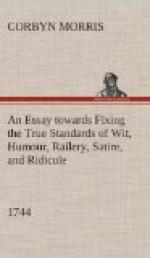The Distinctions between Wit and Humour, and the Reasons why Humour is more pleasurably felt than Wit, are new and excellent: as is the Definition of an Humourist, and the happy Analysis of the Characters of Falstaff, Sir Roger de Coverly, and Don Quixote; But, as you say, the Merit of these Parts is universally allowed; as well as the Novelty, and liberal Freedom of the [word apparently omitted]; which have such Charms in my Eye, as I had long ceased to expect in a Modern Writer.
I
am, &c
25 May, 1744
J——
W——
[not identified]
If the “Gentlemen of Abilities” of the day found some of Morris’s definitions obscure, modern readers will find them more precise than those of most of his predecessors. All who had gone before—Cowley, Barrow, Dryden, Locke, Addison, and Congreve (he does not mention Hobbes)—Morris felt had bungled the job. And although he apologizes for attempting what the great writers of the past had failed to do, he has no hesitation in setting forth exactly what he believes to be the proper distinctions in the meanings of such terms as wit, humour, judgment, invention, raillery, and ridicule. The mathematician and statistician in Morris made him strive for precise accuracy. It was all very clear to him, and by the use of numerous anecdotes and examples he hoped to make the distinctions obvious to the general reader.
The Essay shows what a man of some evident taste and perspicacity, with an analytical mind, can do in defining the subtle semantic distinctions in literary terms. Trying to fix immutably what is certain always to be shifting, Morris is noteworthy not only because of the nature of his attempt, but because he is relatively so successful. As Professor Edward Hooker has pointed out in an Introduction to an earlier ARS issue (Series I, No. 2), his is “probably the best and clearest treatment of the subject in the first half of the eighteenth century.” It may be regretted that political and economic concerns occupied so much of his later life, leaving him no time for further literary essays.
In the present facsimile edition, for reasons of space, only the Introduction and the main body of the Essay are reproduced. Although Morris once remarked to David Hume that he wrote all his books “for the sake of the Dedications” (Letters of David Hume ed. Greig, I, 380), modern readers need not regret too much the omission of the fulsome 32 page dedication to Walpole (The Earl of Orford). Morris insists at the beginning that the book was inspired by a fervent desire of “attempting a Composition, independent of Politics, which might furnish an occasional Amusement” to his patron. The praise which follows, in which Walpole is said to lead “the Empire of Letters,” is so excessive as to produce only smiles in twentieth




